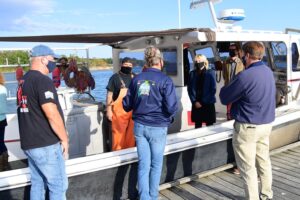This October the Cooperative Solutions Working Group at CWOP hosted our monthly meeting on cooperative solutions, with a targeted examination of cooperative models that support workers in the gig economy. These regular meetings are intended to bring together those who represent workers, industry and communities to collectively explore and learn how we may build community and worker power, in our businesses, our neighborhoods and our economic supply chains. Before the pandemic, it was projected that by this year our economy would reach 40% of the workers in the gig economy.[1] It looks like we have already surpassed that prediction and the burning question to labor and justice activists is: How do we expand the pathways for decent protection, representation and pay at work?
We heard from the following representatives about their stories, their proposals, and their innovation. Links are included as they are mentioned. At the end of this post is a link to the full recording of the meeting.
Neil Gladstein, former Director of Strategic Resources for the International Association of Machinists & Aerospace Workers (IAM), spoke about the Machinists’ strategy in Maine with the lobster industry where they formed a cooperative of independent Lobstermen and women, helped to purchase a production/distribution facility and expanded their membership by forming an affiliate local.
- Get your lobster here!
- MIT Case Study on Lobster 207
- Jill Biden visits Lobstermen and women with the IAM
Ra Criscitiello, Deputy Director of Research at SEIU-United Healthcare Workers West shared the work they have done with a new form of a labor market intermediary called Cooperative Labor Contractors (CLC) and the legislative proposal of the Cooperative Economy Act. This is crafted to employ workers as worker-owners and address the market transformation after California’s AB5 went into effect in January of this year. With AB5, also referred to as the “gig worker bill,” large platform companies will be held accountable for misclassifying workers as independent contractors with no traditional employee protections and benefits.
Read more about it here with links to the formation, the proposed legislation and the system of CLC’s to be developed.
- The UCLA Labor Center report about SEIU-UHW’s co-op legislation was published this month. See full report by UCLA Labor Center HERE
- SEIU UHW West resources on Cooperative Labor Council and Cooperative Economy Act
Anh – Thu Ngnuyen from Democracy at Work Institute with Radiate Consulting discussed the creation of Rapid Response Coops designed to support workers with skills to market who appreciate the chance to work as independent contractors. This work is especially beneficial for recipients of DACA to find employment opportunities post graduation. Her slideshow presentation can be viewed here:
Ajoke Williams from the US Federation of Worker Cooperatives shared how the USFWC is designing Guilded, a worker-owned freelancer cooperative that would relieve the administrative burden put on independent contractors, while providing them access to health and unemployment benefits and financial assistance services along with the development of a payment guarantee fund. The initial pilot is designed for creatives; photographers, writers, graphic designers, artists, etc.
- United States Federation of Worker Cooperatives Website
- The USFWC has a council for union-coops and their partnerships. Check out their website HERE
Erik Forman and Ken Lewis, The Drivers Coop, in a partnership with the Independent Drivers Guild of the International Association of Machinists are applying the cooperative ownership model to the ridesharing/app service structure that will help increase drivers’ earnings by 30% compared to the current driving service system in NYC. The vision includes the creation of an app for matching passengers with drivers and eventually to include transitioning the fleet to electrical vehicles. The coop’s pilot project is to provide rides to the home care workers in Cooperative Home Care Associates. This is a prime example of how coops can do business with other coops, as in line with Principle 6 of the 7 Cooperative Principles, (coops do business with other coops).
Rafael Espinal, President and CEO of The Freelancers Union shared how the burdens of independent contracting can be offset with a cooperative model for cooperative purchases of services and this follows much of what he have learned from speakers on this panel. He mentioned this idea was inspired by Mondragon, the largest ecosystem of a cooperative economy under one large corporation in the Basque Region of Spain where their slogan is,”Humanity at Work”.
These meetings continue monthly as a learning and exploration exercise to build capacity, share knowledge and develop partnerships. If you would like to be added to the list please sign up HERE
A full recording of the October meeting can be found HERE (sans the first few minutes, oops).
NOTE FOR FUTURE EDUCATION:
This coming term we are offering a class that is in a series of courses about cooperative economics at our CUNY School of Labor and Urban Studies. Link to this class is below.
Cooperative Management for a Changing World
[1] https://www.ilo.org/washington/WCMS_642303/lang–en/index.htm



